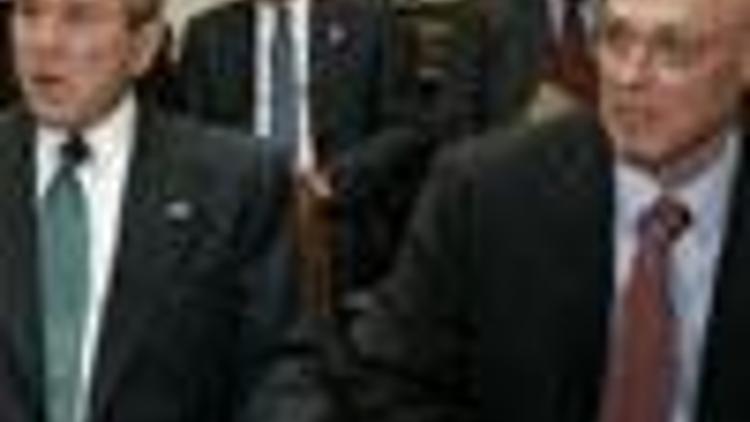Bush meets with G7 ministers in hope of tackling crisis
Güncelleme Tarihi:

US President George W. Bush and finance ministers from the Group of Seven rich countries opened crisis talks on Saturday, looking for unity on a remedy to the global financial crisis.
The ministers of Britain, Canada, France, Germany, Italy, Japan and the heads of the IMF and the World Bank attended the meeting in the White House.
The early morning meeting at the White House came after the Group of Seven finance chiefs agreed Friday to use "all available tools" to support major banks and prevent their failure as they sought to dampen a financial firestorm threatening more mayhem.
The plan followed another day of massive falls on the markets as investors rushed to the exits, putting G7 officials under intense pressure to come up with a convincing accord.
"URGENT AND EXCEPTIONAL ACTION"
Analysts said, however, there was a lack of substance and nothing that would calm the markets and so allow a more measured approach to the problems thrown up rather than the crisis mode of the past few weeks.
"The G7 agrees today that the current situation calls for urgent and exceptional action," a statement released by the US Treasury said.
"We commit to continue working together to stabilize financial markets and restore the flow of credit, to support global economic growth."
The G7 major advanced economies agreed to "take decisive action and use all available tools to support systemically important financial institutions and prevent their failure."
The meeting came ahead of weekend gatherings of the Group of 20, International Monetary Fund and World Bank.
The G7 statement was "a set of noble goals, the sort of thing one should expect," said Peter Morici, business professor at the
"There is nothing there to calm the markets, no substance (in the statement) to do that," Morici said, while adding that it did at least contain the things that needed to be done, if not the action to bring them about.
G7 VOWS TO TAKE STEPS
The G7 said they would take "all necessary steps to unfreeze credit and money markets and ensure that banks and other financial institutions have broad access to liquidity and funding."
The credit markets are crucial because they are used to provide the short-term funding essential for banks and companies to manage their affairs.
Since the collapse of the
As lending has dried up, business has been increasingly affected, in turn hitting employment and consumer spending to leave the
In this respect, the G7 said they would "ensure that our banks and other major financial intermediaries, as needed, can raise capital from public as well as private sources, in sufficient amounts to re-establish confidence and permit them to continue lending to households and businesses."
Paulson said the G7 had "finalized an aggressive action plan to address the turmoil in global financial markets and the stresses on our financial institutions."
"This action plan provides a coherent framework that will direct our individual and collective policy steps to provide liquidity to markets, strengthen financial institutions, protect savers, and enforce investor protections," said Paulson, the architect of a 700-billion-dollar bank bailout passed by Congress last week.
STOCKS IN FREEFALL
The G7 agreement came after global stock markets went into a freefall Friday, even though Wall Street managed to stem the losses in a session of ups and downs.
Some markets plunged 10 percent in the worst performance since the 1987 stock crash as part of a global meltdown that began with Tokyos 9.6 percent nosedive.
On Wall Street, the Dow Jones Industrial Average saw early losses of as much as 700 points, and two sudden spurts into positive territory before closing down 128.00 points (1.49 percent) at 8,451.19.
The market saw a stomach-churning session at the end of a vicious week of selling that sent the Dow and S&P indexes tumbling 18 percent.

